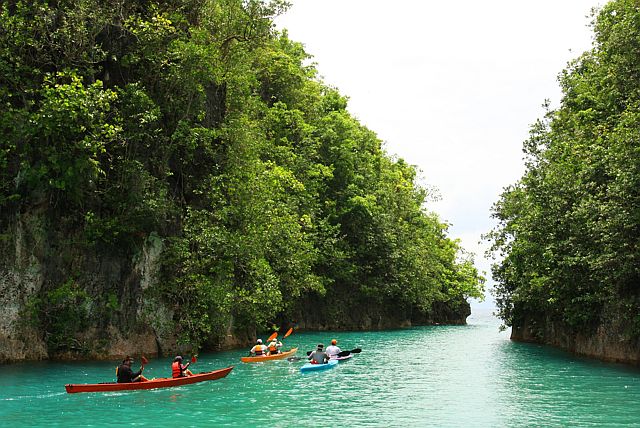Aloguinsan recognition sets benchmark for other towns

ALOGUINSAN ADVENTURE: Local tourists explore the Bojo River in Aloguinsan town in southwest Cebu. The local government developed the area as a tourist destination (CDN PHOTO/TONEE DESPOJO).
Local tourism stakeholders welcomed the recognition of Aloguinsan town in Cebu as among the world’s top 100 tourism destinations and encouraged other local governments in the province to draw inspiration from the municipality.
Judy Gabato, OIC of the Department of Tourism in Central Visayas (DTI-7), said the agency was glad to know that Aloguinsan has been recognized internationally.
“It’s a very good example of local government initiative. The town’s ecotourism project has benefited the local community, and stakeholders there have a better understanding of the importance of sustainable tourism,” she said in a text message.
Aloguinsan is the only area in the Philippines that was included in the list of the world’s top 100 sustainable tourism destinations through its Bojo River.
On Tuesday, Cebu Provincial Tourism Officer Joselito Costas announced that the municipality was given the recognition by Green Destination, an online global partnership of five big names in sustainable tourism, and endorsed by the United Nations World Tourism Organization, National Geographic and the World Wildlife Fund.
This development has placed Bojo River alongside other famous sustainable global destinations like the Niagara Falls in Canada, Cape Town in South Africa and Jackstone Hole and Yellowstone in the United States of America.
Recognizing the tourism potential of the 1.4-kilometer Bojo River, local residents took it upon themselves to ensure that its environment remains clean, especially since the municipality spearheads the river cruise, which was launched in 2013.
Some villagers have been booking tourists for river tours just like the more popular Loboc River cruise in Bohol. The difference is that the Bojo River is placid, allowing tourists to take small wooden boats and witness a panoramic vista of mangrove forests that serve as home to around 60 bird species.
In an earlier report, Costas explained that Green Destination set core criteria in deciding which areas would be included in the list, such as sustainability of the project, local tourism policy, nature protection measures and the site’s cultural heritage, among others.
Costas said the community of Bojo is giving scholarships to poor children, including those not even from their town’s barangay, funded by their income from the Bojo River cruise.
The Capitol official said that tourism is sustainable when its benefits are spread throughout the local community.
Gabato, for her part, said that the DOT is encouraging other towns in Cebu to take Aloguinsan’s initiatives as a benchmark to improve their respective tourism industries.
Edilberto Mendoza, president of the Cebu Association of Tour Operators (Cato), said he was elated with the news about Aloguinsan’s recognition.
“Aloguinsan and Cebu, in general, really have the potential to be known globally. This poses a challenge to all of us to really do our share in promoting Cebu to the rest of the world,” he said.
Mendoza added that ecotourism is just as important as any other form of tourism as it maintains the balance between nature and economic progress and
development.
Disclaimer: The comments uploaded on this site do not necessarily represent or reflect the views of management and owner of Cebudailynews. We reserve the right to exclude comments that we deem to be inconsistent with our editorial standards.
